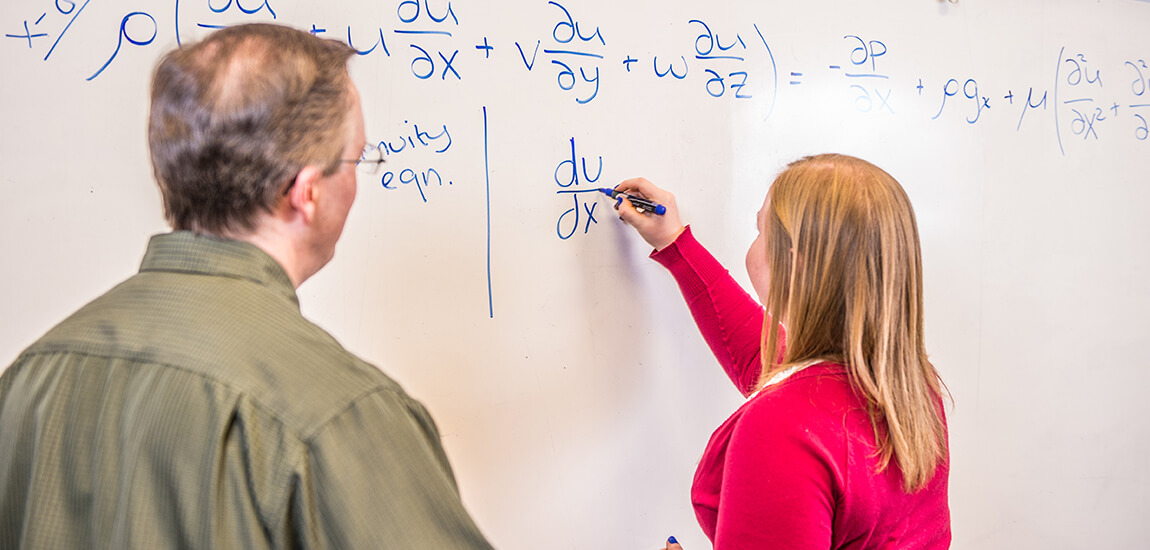The mathematics education degree will prepare you to teach mathematics to children in grades 5-12. This degree also prepares you for further graduate study.
A degree in mathematics education may be the right degree for you if you
- enjoy problem solving
- are comfortable working with numbers
- are eager to serve
- are passionate about teaching
- are interested in a career in education
Why study mathematics education at Northwestern?
You’ll learn the subject matter and how to create a supportive learning environment for students of all backgrounds. Our faculty believe in equipping you with the expertise and cultural competence needed to stand out from your peers.
Northwestern’s Department of Teacher Education provides four levels of classroom practicum experience:
- The first level allows you to find your personal “fit” within the teaching profession.
- The second focuses on developing theory and skills related to diversity.
- The third engages you to apply methodologies within your chosen field by creating, teaching, and evaluating lessons in a school classroom.
- The final level is full-time student teaching in a chosen licensure field.
The Department of Teacher Education provides teacher education programs approved by the MN Professional Educator Licensing and Standards Board as a result meet the state standards adopted for licensure programs as defined in state rule 8710.2000 through 8710.8080. All licensure programs are aligned with INTASC (Interstate Teacher Assessment and Support Consortium) standards and the Minnesota Standards of Effective Practice.
Request Information
Careers in mathematics education
There are a variety of career and academic pathways that begin with a degree in mathematics education.
What types of work are related to this degree?
- Teaching in your area of specialty
- Private tutoring
- Creating/directing educational programs
- Curriculum development
- Instructional design (technology training may be required)
- Textbook editing
- Online education
- Student life/student affairs
- Corporate or business training and development
- Statistician
- Mathematical modeling
- Institutional research
- Teacher for US citizenship classes
What will I learn?
You will learn to analyze, solve problems, and be able to teach mathematics to children in grades 5-12.
MAT 3255
Advanced Concepts of Middle School Mathematics
An in-depth, college-level study of the foundational structure underlying the major mathematical concepts taught in the middle grades. Content strands include number and operations, patterns and algebra, geometry and measurement and data analysis and probability. Includes emphasis on key transitions in mathematical thinking and connection of middle-level concepts to college math course content.
MAT 3265
Advanced Concepts of High School Mathematics
A study of foundational secondary level mathematics concepts from an advanced, college-level perspective. Content strands include number system structures, functions and equations, integers and polynomials, congruence and symmetry, area and volume, trigonometry, data analysis and probability and discrete math topics. Includes emphasis on extensions and generalizations, applications, problem solving and connection of secondary level concepts to college math course content.
MAT 3245
Geometry
The study of Euclidean and non-Euclidean geometry from axiomatic, synthetic, analytic and transformational approaches with emphases on modeling, inductive and deductive reasoning and proof techniques.
MAT 3211
Linear and Abstract Algebra
Fundamental concepts from linear algebra, including: systems of linear equations, the algebra of matrices, linear transformations, eigenvalues and determinants. Fundamental concepts from abstract algebra, including: group theory, ring theory, field theory, equivalence relations, isomorphisms and homomorphisms. Fundamental structures such as congruences, number systems, polynomials, permutations and symmetry groups.
MAT 2055
Statistics
Descriptive and inferential statistics include methods for describing data, binomial and normal probability distributions, tests of hypotheses, simple linear regression, analysis of variance, nonparametric techniques, two-sample testing and contingency tables.

Still have questions about this program or how to apply?
Our team is ready with answers!
Discover the School of Education & Behavioral Sciences
Professors at Northwestern are focused on their students first. Our faculty include experts in their respective fields who want to help you grow in your faith while you earn your degree.

